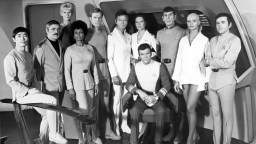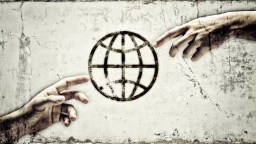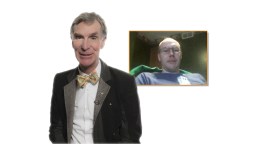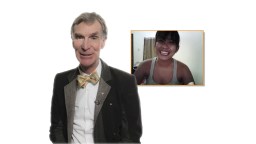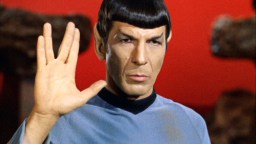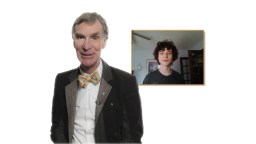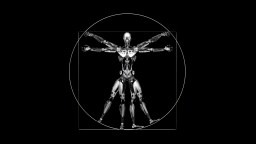All Videos
All Stories
Contrary to popular belief, leadership really can be learned.
▸
1 min
—
with
Does the typical college student understand the sort of mental health care options available to them? Dr. Judith Brisman of Eating Disorder Resource Center continues our series “Big Thinkers on Mental Health.”
▸
5 min
—
with
Also: Hear the powerful story behind how Mister Sulu got his name.
▸
5 min
—
with
Symmetry is about way more than splitting circles: It’s change without change, and it has applications throughout mathematics, physics, and nature.
▸
5 min
—
with
Playing games in school develops the kind of social and emotional skills that translate to adult success.
▸
4 min
—
with
Much to the chagrin of NASA rocket scientist Dr. Wernher von Braun, President Richard Nixon chose instead to greenlight the space shuttle program because it intrigued the military-industrial complex.
▸
4 min
—
with
Jim Gilliam tells how the Internet saved his life — literally! — and how unprecedented connectivity is shifting the global community in chaotic, exciting ways.
▸
9 min
—
with
Most likely not, though Bill’s not ruling it out completely.
▸
2 min
—
with
Photojournalist Lynsey Addario believes in the power of images. They engage in a way text and writing can’t. That’s why photographs are so vital in educating the public about conflicts, war, poverty, and other troublesome issues worldwide.
▸
2 min
—
with
Does the typical college student understand the sort of mental health care options available to her? Dr. Victor Schwartz of The Jed Foundation continues our series “Big Thinkers on Mental Health.”
▸
6 min
—
with
Are your family trips an exercise in pleasure or comfort? Behavior economics guru Dan Ariely notes that there’s a vivid difference between the two… and it may mean the difference between a fantastic vacation and one that’s just okay.
▸
3 min
—
with
People with disabilities shouldn’t have to try and pass as able in the workplace, says writer and comedian Maysoon Zayid. But the sad reality is that America’s largest minority remains invisible throughout popular media.
▸
3 min
—
with
Inequality in America has risen since the 1980s, but robust democratic institutions can turn this trend around.
▸
3 min
—
with
To what extent are you “yourself” at work? Renowned legal scholar Kenji Yoshino studies the phenomenon of “covering.”
▸
4 min
—
with
Establishing a colony on Mars would protect the long-term survival of the human race.
▸
3 min
—
with
This week’s question arrives from the Philippines, courtesy of Amy. Bill dissects the question before giving several possible answers.
▸
2 min
—
with
Ian Bremmer calls Hillary Clinton a “moneyball” candidate for president.
▸
4 min
—
with
Dr. Christine Moutier of the American Foundation for Suicide Prevention continues our series “Big Thinkers on Mental Health” with ways society can combat the rising suicide trend.
▸
4 min
—
with
Moving past racism “is about respecting and reveling in the humanity of every other fellow citizen.”
▸
2 min
—
with
That’s right… giant parsnip steak. Sound appetizing? In this video, chef Dan Barber explains why it’s important to cook your food using a diverse array of natural ingredients from your local environment.
▸
4 min
—
with
Once you have that kind of ability to relate to your own situation with kindness, says Thupten Jinpa, it creates a kind of a reservoir of strength and resilience so that you have plenty to draw from.
▸
2 min
—
with
Emotions can cloud our rational decision-making. By adopting the perspective of an outside advisor, psychologist Dan Ariely says we can inject some rationality into our cognitive processes.
▸
3 min
—
with
Rising high school senior Wesley asks Bill for career advice. The Science Guy delivers.
▸
4 min
—
with
We’re six months away from the Iowa Caucus, so there’s plenty of time for other Republican candidates to clarify views, but so far only Marco Rubio and Rand Paul have proven themselves articulate and knowledgeable on foreign policy.
▸
2 min
—
with
Google is just a privatized NSA; the powerful are continuously trying to control the weak. Slavoj Žižek may have some misgivings about our brave new world, but that doesn’t mean he’s going to buckle beneath the weight of unnecessary fears.
▸
2 min
—
with
Dr. Helen Blair Simpson of Columbia University Medical Center continues our series “Big Thinkers on Mental Health” with an informative crash course on the intricacies of Obsessive-Compulsive Disorder.
▸
5 min
—
with
Artists and scientists alike strive “to figure out the deep truths of reality,” explains physicist Brian Greene. The ways they pursue that goal are different, but there’s no reason why two segments of society seeking answers can’t work together.
▸
2 min
—
with
The online experience is changing rapidly, explains Harvard Law professor Jonathan Zittrain, and not necessarily for the better. We should act to make sure certain norms such as web surfing persist as they are.
▸
5 min
—
with
The single best way for businesses to remain vital is to cultivate the people that power them.
▸
5 min
—
with
Author Stephen J. Dubner analyzes the economics of drug dealing in the most Freakonomics way possible, comparing the capitalist tendencies of Walgreens with your friendly neighborhood gang of crack dealers.
▸
4 min
—
with


